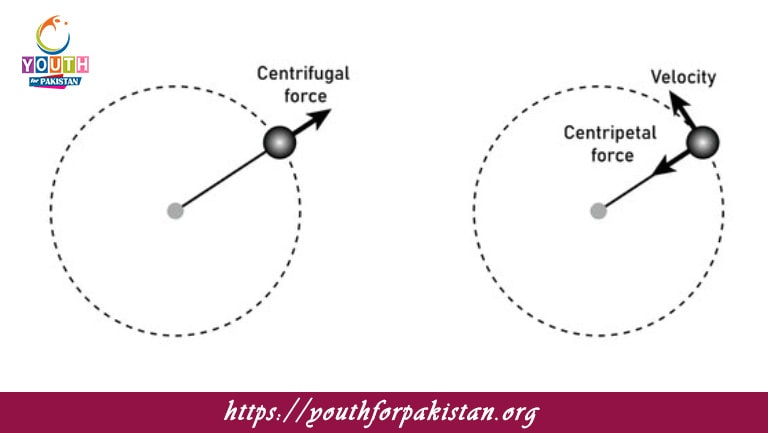Welcome to the Centripetal Force MDCAT MCQs with Answers. In this post, we have shared Centripetal Force Multiple Choice Questions and Answers for PMC MDCAT 2024. Each question in MDCAT Physics offers a chance to enhance your knowledge regarding Centripetal Force MCQs in this MDCAT Online Test.
Centripetal Force MDCAT MCQs Test Preparations
What is the formula for centripetal force?
a) F = mgh
b) F = mv²/r
c) F = ma
d) F = kx
Which of the following provides the centripetal force for an object moving in a circle?
a) Friction
b) Tension
c) Gravitational force
d) All of the above
If the velocity of an object in circular motion is doubled, the centripetal force will:
a) Double
b) Quadruple
c) Remain the same
d) Halve
In a banked curve, the centripetal force is provided primarily by:
a) The frictional force
b) The normal force
c) The gravitational force
d) The applied force
What happens to the centripetal force if the radius of the circle is halved while keeping the velocity constant?
a) It doubles
b) It halves
c) It quadruples
d) It remains the same
In a vertical circular motion, at the highest point of the path, the centripetal force is:
a) Less than the gravitational force
b) Equal to the gravitational force
c) More than the gravitational force
d) Zero
What provides the centripetal force for a satellite orbiting Earth?
a) Electromagnetic force
b) Frictional force
c) Gravitational force
d) Tension
If the mass of an object moving in a circle is doubled while keeping speed and radius constant, the centripetal force will:
a) Double
b) Quadruple
c) Remain the same
d) Halve
Which force is not involved in providing centripetal force?
a) Friction
b) Tension
c) Gravitational force
d) Magnetic force
For an object in uniform circular motion, the centripetal force is directed:
a) Away from the center
b) Towards the center
c) Tangentially to the circle
d) Perpendicular to the velocity
What is the effect of increasing the speed of an object in circular motion on the centripetal force?
a) It increases
b) It decreases
c) It remains constant
d) It becomes zero
If the radius of a circular path is tripled and the speed is kept constant, the centripetal force will:
a) Triple
b) Remain the same
c) One-third
d) One-ninth
The centripetal force acting on a car rounding a curve on a flat road is provided by:
a) Friction
b) Normal force
c) Gravity
d) Tension
In a conical pendulum, the centripetal force is provided by:
a) Tension in the string
b) Gravitational force
c) Normal force
d) Friction
For a planet orbiting the Sun, the centripetal force is:
a) Provided by the Sun’s gravitational pull
b) Provided by the planet’s rotational force
c) Equal to the centripetal acceleration
d) Provided by the planet’s orbital velocity
In a centrifuge, the centripetal force is provided by:
a) The tension in the rotating arm
b) The walls of the centrifuge
c) The gravitational force
d) The normal force
If the speed of an object moving in a circle is halved, the centripetal force will:
a) Double
b) Quadruple
c) Remain the same
d) Quarter
In a car taking a turn on a banked curve, the centripetal force is provided by:
a) The frictional force
b) The normal force
c) The gravitational force
d) The tension in the car’s tires
In a circular motion, the centripetal force is always:
a) Tangential to the direction of motion
b) In the direction of the velocity
c) Radially inward
d) Radially outward
When a car goes around a curve with constant speed, the centripetal force is provided by:
a) The engine power
b) The friction between the tires and the road
c) The gravitational force
d) The normal force
What happens to the centripetal force if both the mass and the velocity of an object in circular motion are doubled?
a) It remains the same
b) It doubles
c) It quadruples
d) It increases by a factor of eight
In a spinning space station, what force makes the astronauts feel like they are being pushed outward?
a) Gravitational force
b) Centrifugal force
c) Normal force
d) Tension
Which of the following factors does not affect the centripetal force?
a) Speed of the object
b) Radius of the circular path
c) Mass of the object
d) Acceleration due to gravity
For an object moving in a circular path, the centripetal force can be increased by:
a) Decreasing the speed
b) Increasing the radius
c) Increasing the speed
d) Decreasing the mass
At the bottom of a vertical loop, the centripetal force is:
a) Equal to the gravitational force
b) Less than the gravitational force
c) Greater than the gravitational force
d) Zero
If the radius of a circular path is doubled and the speed is doubled, the centripetal force will:
a) Remain unchanged
b) Double
c) Quadruple
d) Increase by a factor of eight
In a car’s circular motion, if the coefficient of friction is increased, the maximum centripetal force that the car can experience will:
a) Decrease
b) Increase
c) Remain the same
d) Become zero
In a spinning record, what force provides the centripetal force to keep the needle in place?
a) Frictional force
b) Tension
c) Normal force
d) Gravitational force
The centripetal force needed for an object moving in a circle is directly proportional to:
a) The square of the velocity
b) The radius
c) The mass
d) The radius squared
In a circular path, the centripetal force acts:
a) Parallel to the velocity
b) Opposite to the velocity
c) Radially outward
d) Radially inward
What type of force is the centripetal force when considering a spinning wheel?
a) Real force
b) Apparent force
c) Reaction force
d) Non-contact force
If the speed of an object is constant but the radius is halved, what happens to the centripetal force?
a) It remains the same
b) It doubles
c) It quadruples
d) It halves
What happens to the centripetal force if the radius is increased while keeping the speed constant?
a) It increases
b) It decreases
c) It remains the same
d) It becomes zero
In a vertical circle, at the bottom of the path, the centripetal force is:
a) Equal to the gravitational force
b) Less than the gravitational force
c) More than the gravitational force
d) Zero
What force causes a car to skid when taking a sharp turn too fast?
a) The centripetal force
b) The frictional force
c) The gravitational force
d) The normal force
In a uniform circular motion, the centripetal force is always:
a) In the direction of motion
b) Away from the center
c) Towards the center
d) Tangential to the circle
In a rotating carousel, what provides the centripetal force for a rider?
a) The seatbelt
b) The friction between the rider and the seat
c) The normal force from the seat
d) The gravitational force
Which of the following does not directly influence the centripetal force required for circular motion?
a) Radius of the path
b) Speed of the object
c) Mass of the object
d) Ambient temperature
In a horizontal circular motion, what provides the centripetal force when a vehicle takes a turn?
a) The road’s surface
b) The vehicle’s engine
c) The car’s inertia
d) The gravitational pull
For an object moving in a circle, if the centripetal force is suddenly removed, the object will:
a) Continue moving in a circular path
b) Move in a straight line tangent to the circle
c) Accelerate towards the center
d) Stop moving immediately
If you are interested to enhance your knowledge regarding Physics, Chemistry, Computer, and Biology please click on the link of each category, you will be redirected to dedicated website for each category.










